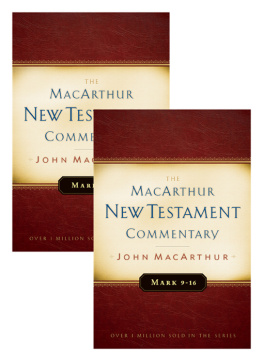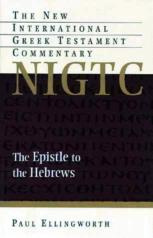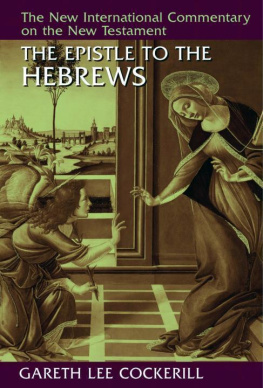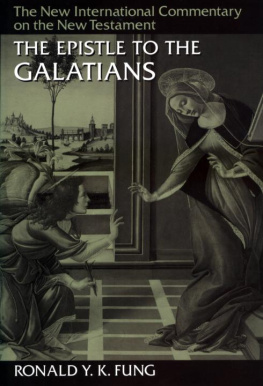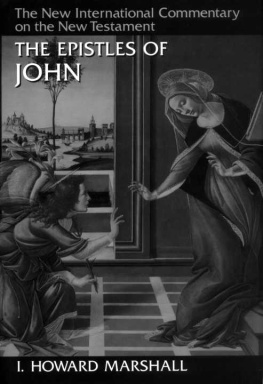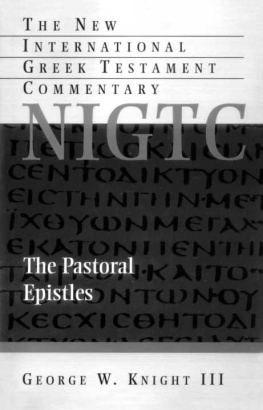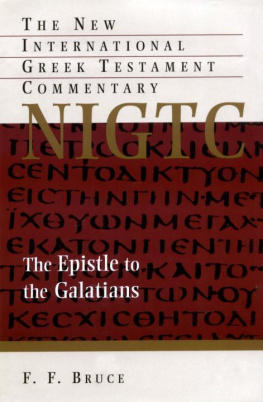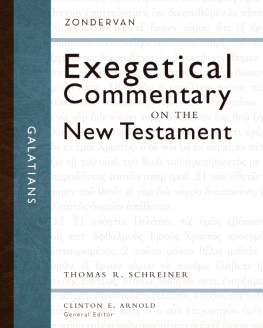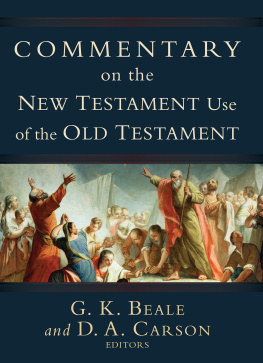THE NEW INTERNATIONAL COMMENTARY
ON THE NEW TESTAMENT
GORDON D. FEE
General Editor
The Epistle to the
HEBREWS
Revised Edition
by
F. F. BRUCE
Emeritus Professor
University of Manchester



To the Memory
of
NED BERNARD STONEHO USE
xi
xiii
xiv
xix
PREFACE TO THE FIRST EDITION
On June 25, 1954, I received an invitation from Dr. N. B. Stonehouse, our first General Editor, to undertake the volume on the Epistle to the Hebrews for the New International Commentary on the New Testament. Since then I have spent a good part of my time with this epistle, and have learned to appreciate increasingly the viewpoint and purpose of its unknown author-still as much unknown by name to me as when I embarked on the serious study of his work, but not, I think, completely unknown in other respects.
For many readers the Epistle to the Hebrews is among the more difficult books of the New Testament. Its magnificent style, to which King James's revisers (following in William Tyndale's footsteps) did full justice, can be more easily appreciated than the details of its argument, which call for a greater familiarity with its Old Testament background and a better understanding of certain phases-of first-century biblical exegesis than most readers possess. Sir Edmund Gosse in Father and Son tells of the difficulty which he found in his boyhood in following his father's reading and exposition of the epistle. "The melodious language, the divine forensic audacities, the magnificent ebb and flow of argument which make the `Epistle to the Hebrews' such a miracle, were far and away beyond my reach, and they only bewildered me."
To many people, it is said, the Epistle to the Hebrews is just "the book about Melchizedek"-although Melchizedek occupies only some twenty out of the epistle's more than three hundred verses. Others find themselves out of their depth when they come across references to "the blood of bulls and of goats and the ashes of a heifer sprinkling the unclean," and wonder what all this has to do with true religion. The writer to the Hebrews, in fact, is concerned to argue that all this has nothing to do with true religion; but he is dealing with people who had been brought up to think that it had much to do with it. But what has his argument to say to readers today who are not at all disposed to think that animal sacrifices play any part in the worship of God? It has this to say: that true religion or the worship of God is not tied to externalities of any kind. Our author is insisting on the inwardness of true religion, on the necessity of a purified conscience as the one indispensable condition for offering God acceptable worship in that true sanctuary which no human hands have built.
Moreover, this is the book which establishes the finality of the gospel by asserting the supremacy of Christ-his supremacy as God's perfect word to man and man's perfect representative with God. More than any other New Testament book it deals with the ministry which our Lord is accomplishing on his people's behalf now. In a day of shaking foundations it speaks of the kingdom which cannot be shaken. It reminds Christians that it is no part of their calling to settle down and be content with things as they are, but to press forward continually in God's advancing purpose, along the trail already blazed by the Pioneer of Faith. And when they are tempted to be discouraged and give up the onward march, it revives their drooping spirits and supplies many incentives to press on to that eternal commonwealth which is the true homeland of loyal souls. A book which does all this, no matter what imagery it uses, is a book which speaks to the condition of the church throughout the world in the second half of the twentieth century.
My debt to others in the following pages is enormous, and can be acknowledged only very inadequately. Among previous expositors Calvin and Westcott, James Moffatt and Geerhardus Vos have been of great help. C. Spicq's encyclopaedic commentary has always been within arm's reach. For drawing out and applying to the conscience the practical lessons of the epistle G. H. Lang has few rivals. And I am not the only writer on the epistle in recent years for whom William Manson has provided it with a more convincing life-setting than anyone else has done. But this list is not exhaustive. Others who have helped me clamor for admittance: A. B. Davidson, E. Riggenbach, and H. Windisch-but the author's preface is not the place for a bibliography.
I must add a word of thanks to the Very Reverend D. E. W. Harrison, Dean of Bristol. In the winter of 1955-56, when he was Archdeacon of Sheffield and I lived in the same city, he and I jointly conducted a study class on the Epistle to the Hebrews for the Extramural Department of Sheffield University. My understanding of the epistle was very considerably deepened as a result of this happy collaboration with him.
To Dr. Stonehouse my debt of gratitude is great indeed, for the invitation to write this commentary and for many other tokens of friendship and fellowship. In acknowledgment, but by no means in repayment, of this debt the finished work is dedicated to his memory.

PREFACE TO THE REVISED EDITION
The policy of keeping the commentaries in this series up to date has dictated the revision, after a quarter of a century, of this volume on Hebrews.
In these twenty-five years my general understanding of this epistle has not changed in any material respect, but I have profited from my own further study of it and still more from the publications of a number of colleagues which have appeared since the first edition was issued. If one of these colleagues may be singled out for special mention, I have been greatly indebted to the work of Pere Albert Vanhoye, S.J., of the Pontifical Biblical Institute. To his name I must add those of four former research students of mine from whom I have learned more about Hebrews than they ever learned from meBruce A. Demarest, Pauline Giles, David G. Peterson, and Norman H. Young. A teacher can have no greater satisfaction than to greet the output of students such as these.
As for all the original volumes of the New International Commentary on the New Testament, the American Standard Version of 1901 served as the basic text for the first edition of this. It has now been replaced by an ad hoc translation of my own.


